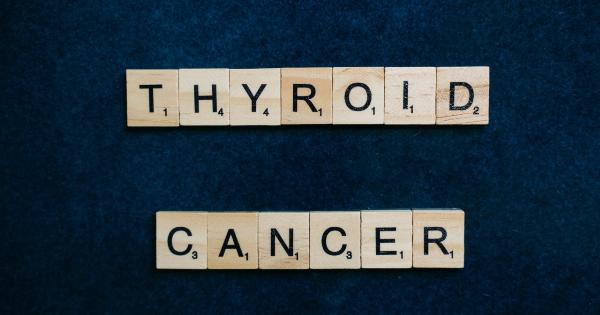Thyroid nodules are abnormal growths of tissue within the thyroid gland. They are common and affect approximately 50% of the population by age 60. Most thyroid nodules are not cancerous and do not cause any symptoms.
However, in rare cases, thyroid nodules can be cancerous. In this article, we will discuss the signs and symptoms of thyroid nodules.
What are Thyroid Nodules?
The thyroid gland is a butterfly-shaped gland in the neck that produces hormones (thyroxine and triiodothyronine) that regulate metabolism. Thyroid nodules are lumps or growths that form on the thyroid gland.
They can be filled with fluid (cysts) or solid tissue, and can vary in size from very small to very large. Most thyroid nodules are found during a routine physical exam and are not cancerous.
Risk Factors for Thyroid Nodules
There are several factors that increase the risk of developing thyroid nodules, including:.
- Being female (women are more likely to develop thyroid nodules than men)
- Age (thyroid nodules are more common in people over 60)
- Family history of thyroid conditions
- Exposure to radiation
- Iodine deficiency
Symptoms of Thyroid Nodules
In most cases, thyroid nodules do not cause any symptoms. They are usually discovered during a routine physical exam or medical imaging test. However, in some cases, thyroid nodules can cause the following symptoms:.
- Swelling or lump in the neck
- Pain in the neck or throat
- Difficulty swallowing or breathing
- Hoarseness or voice changes
- Weight gain or loss
- Fatigue
- Hair loss
- Irregular periods
If you are experiencing any of these symptoms, it is important to see your doctor to determine the cause.
Types of Thyroid Nodules
There are several types of thyroid nodules, including:.
- Colloid nodules: These are the most common type of thyroid nodules. They are usually benign and do not cause any symptoms.
- Thyroid cysts: These are fluid-filled nodules that are usually benign.
- Thyroid adenomas: These are benign nodules that are made up of thyroid cells.
- Papillary thyroid cancer: This is the most common type of thyroid cancer and usually grows slowly.
- Follicular thyroid cancer: This type of thyroid cancer is less common than papillary thyroid cancer and can spread to other parts of the body.
Diagnosing Thyroid Nodules
If your doctor suspects that you have a thyroid nodule, they may recommend the following tests:.
- Physical exam: Your doctor will examine your neck to feel for any lumps or swelling.
- Blood tests: Your doctor may order blood tests to check your thyroid hormone levels.
- Ultrasound: This imaging test uses sound waves to create an image of your thyroid gland.
- Fine needle aspiration biopsy: This is a procedure to remove a small sample of tissue from the thyroid nodule for testing.
Treatment for Thyroid Nodules
Treatment for thyroid nodules depends on the type of nodule and whether or not it is cancerous. In most cases, no treatment is needed for benign thyroid nodules that do not cause any symptoms.
However, if the nodule is cancerous, treatment options may include:.
- Surgery: Surgery to remove the thyroid gland (thyroidectomy) may be recommended for cancerous thyroid nodules.
- Radiation therapy: This treatment uses high energy X-rays to kill cancer cells.
- Radioactive iodine therapy: This treatment uses a radioactive form of iodine to kill thyroid cancer cells.
Conclusion
Thyroid nodules are common and most of them are not cancerous. However, in rare cases, thyroid nodules can be cancerous.
If you are experiencing any symptoms of thyroid nodules or have a family history of thyroid conditions, it is important to see your doctor. Your doctor can perform tests to determine the cause and recommend appropriate treatment options if necessary.




























